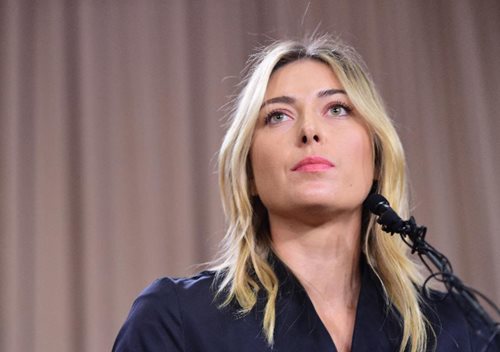
Just a day after Maria Sharapova announced that she’d tested positive for a banned substance at this year’s Australian Open, the blowback is beginning.
More: Henin, Safin Express Sadness over Sharapavo's Suspension
Several key sponsors in the Russian’s endorsement portfolio have taken a stance, beginning with Nike.
"We are saddened and surprised by the news about Maria Sharapova," Nike responded in a statement, according to the AP. "We have decided to suspend our relationship with Maria while the investigation continues. We will continue to monitor the situation."
It is the second high-profile athlete that has caused a problem for the retail giant this year. Nike cut ties with Manny Pacquiao in February after he made derogatory comments about same sex couples. 28-year-old Sharapova signed an eight-year, $70 million contract with Nike in 2010.
TAG Heuer, which had been discussing a new deal with Sharapova after its sponsorship expired at the end of 2015, said it would not sign Sharapova due to the current controversy. German automaker Porsche also said it has chosen to postpone its relationship with Sharapova until more facts about the case are revealed. Bottled water company Evian hasn’t plotted a course yet, instead saying that it plans to continue to monitor the situation.
Sharapova faces up to a four-year ban for her offense, but many believe that mitigating circumstances could lead to a shorter suspension, perhaps around a year. The Russian is the highest profile tennis player to test positive for a banned substance since Marin Cilic in 2013. The Croatian allegedly took the substance nikethamide inadvertently when he had his mother purchase a brand of glucose tablets that contained the substance. He claimed he was not aware that he had taken the stimulant and convinced the ITF to lessen his sentence to nine months instead of two years.
Later, through appeal Cilic had the ban trimmed to four months.
Sharapova’s lawyer, John Haggerty, holds out hope that Sharapova’s sentence will be minimal. “We are attempting to have a conversation with ITF up front because we think there are laundry list of extremely mitigating circumstances that once taken into consideration would result in a dramatically reducing any sanction that they might want to impose on Maria,” He told SI’s Jon Wertheim.
Sharapova’s case differs from Cilic in one crucial way, however. She cannot claim that she took the substance inadvertently. The Russian, who told reporters that she had been taking meldonium for ten years to help her deal with irregular EKG results, low magnesium, frequent sickness and the threat of diabetes, continued to take the substance this year, despite the fact that it had been officially placed on the ITFs banned substance list on January 1.
"I made a huge mistake. I let my fans down, I let the sport down," she said. "I don't want to end my career this way, and I really hope that I will be given another chance to play this game."